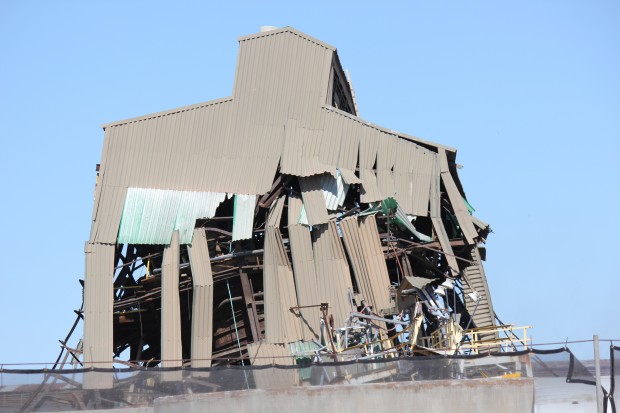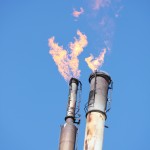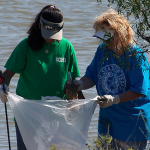A Whistle-Blower’s Report on Hazardous Waste in Corpus Christi
Last week StateImpact Texas reported on a former hazardous waste plant that sits at the edge of a residential neighborhood in Corpus Christi. The Encycle facility, which opened as a hazardous waste plant in 1989, was ultimately shut down for pollution violations. Encycle and its parent company ASARCO filed for bankruptcy after agreeing to $1.7 billion in settlements for polluting.
You can now read what an insider at the plant told the EPA about how the facility ran their operations and endangered the local community. The document was released last year by the EPA, and as the waste plant is finally coming down, it makes for relevant reading.
In his own words, former ASARCO employee David Cahill wrote to EPA investigators that the plant was originally designed to deal with liquid wastes, but after a few years “it became apparent that there were not enough liquid waste streams available to make Encycle a profitable company.” So in 1989, the company moved into solid waste recycling, “without being well prepared to do so.” Some of the wastes they processed included cyanide, lead and cadmium.
The way Cahill sees it, what Encycle did next was basically create a Potemkin village of hazardous waste. Encycle went “to great lengths to create the perception” that they could process the solid waste. But in reality, Cahill writes, “Encycle/Texas does little processing of the solid wastes to recover individual metals. The solid wastes are dumped into empty tanks, dumped directly into the product bins, and some are processed for show… to impress customers” and regulators. Essentially, Encycle was taking hazardous waste and moving it to a new container, while telling customers and regulators that it had been processed.
The document:
Encycle then got approval from state regulators to store more wastes at the plant, so long as they met the classification of “meeting or exceeding product specifications,” meaning they were too compromised or impure to be cleaned up.
What happens next? “Enycycle exploits this ruling to increase its production rate and revenue. Many inbound wastes that do not meet product specifications are dumped into the product bins.” The bins eventually fill up, so the company mixes the waste in with copper and lead products being sent to an El Paso ASARCO plant for smelting, a gross violation of regulations and a safety hazard to residents near the plant there. (Studies found children living near the El Paso plant had “levels of lead in their blood four times today’s acceptable limit,” according to an NPR report. The company stopped lead smelting there as a result.)
In 1992, Cahill writes, “Enycycle wins a big contract to treat a liquid brine waste from the Rocky Mountain Arsenal in Colorado” as part of a Superfund cleanup project between Shell Oil and the U.S. Army. The brine contained arsenic. “This project would put Encycle in the black,” the whistle-blower writes. “However, it will only last two years.”Things get worse from there. If regulators really knew at the time how badly Encycle was abusing its permits, Cahill writes, “there would be big trouble. At times, Encycle is 3,000 or greater hazardous storage units over the permitted amount of 500 units.” Cahill writes that the company’s Environmental manager “always managed to get a one to two week warning that [regulators were] coming to inspect.”
“Encycle would always be ready for the inspection,” Cahill writes. “The plant would be cleaned up and the hazardous waste inventory lowered to less than 500 units by hiding drums and charging them into empty cans.”
Cahill wasn’t very happy at the plant. He writes in his report that he consistently pushed back on some of the shortcuts his superiors suggested, and tried to move the plant into compliance, but that those above him in the company would always trump him with demands for higher productions.
The lax situation is at times almost comical, if not for the grave dangers behind some of the chemicals and waste being handled. Cahill writes of one instance where several boxes of chrome had been left outside at the port area. Later in the week three inches of rain fall on Corpus Christi, and the boxes end up leaking chrome into the ground. “Encycle spent several days down at the port area cleaning up the spill,” the whistle-blower writes. “The writer [Cahill],” he adds, “does not know if it was reported or not.”
By early 1994, he writes, “plant cleanliness and housekeeping began to deteriorate.” Cahill had had enough. He refused to accept any more waste at the facility. He starts tipping off the head office of the parent company, ASARCO, and Cahill’s superiors at the plant suspend him for two weeks without pay. They ask him to resign, and he responds by calling state regulators to tell them of violations at the plant. He’s fired by Encycle on April 23, 1994.
In 1999, the Encycle operation was officially found to be violating its permits. Encycle stopped operating a few years later in 2003 and completely shut down in 2005.



